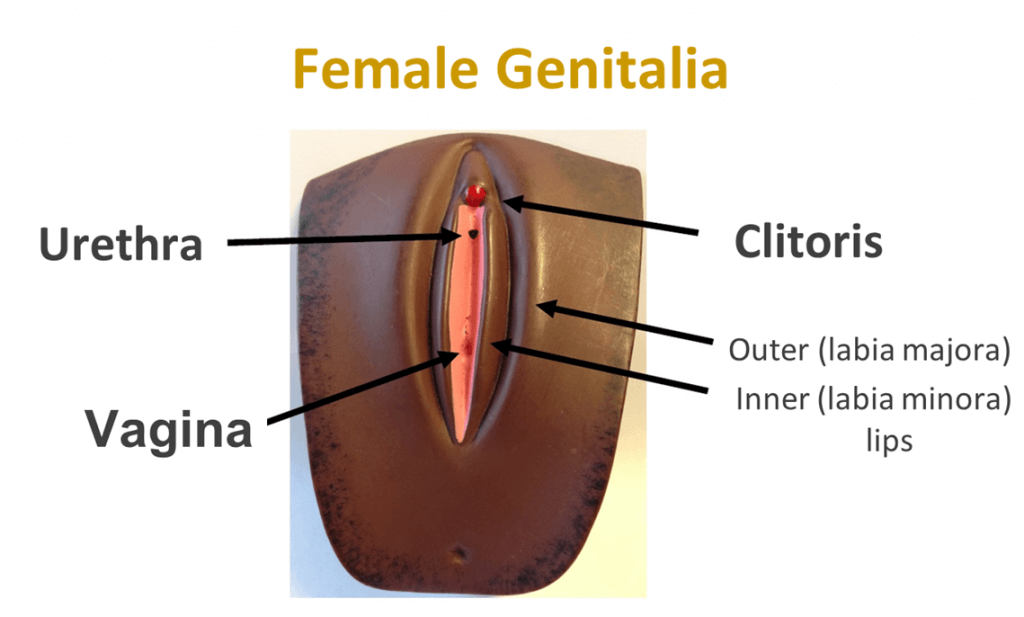“It is shocking how little people know about their own bodies. Particularly when you get all girls classes and they get all giggly and embarrassed and I’m like ‘but it’s your body you should have a right to know what it looks like, how it functions, you know you get to own that and be proud of it‘“
Your genitals (private area between your legs) are an important part of your body and have several essential jobs – including getting rid of waste through urinating/weeing and allowing you to have a baby.
It is important to know how your body works so you can look after yourself. See below to learn more about how your reproductive system works:
There are diagrams but no photographs.
External Female Genitals
This is a photograph of an image of natural external female genitals. Everybody’s looks different, so don’t worry if yours don’t look quite like this.

Your vagina is a slightly larger hole that is connected to your womb. This is where your period comes out, where the penis enters during sexual intercourse, and where the baby comes out during childbirth.
Your urethra is the smaller hole above the vagina which is connected to your bladder. This is where you urinate (‘wee’) from.
Your inner and outer lips are also known as labia majora (outer) and labia minora (inner). They are made of very stretchy material like elastic bands – this allows them to expand and contract. This makes sex more comfortable, and also makes childbirth possible – they will stretch to allow the baby’s head to fit out of the vaginal opening.
Everybody’s lips look different – some are larger than others, some hang lower, sometimes the inner lips hang outside the outer lips. This is fine, common and healthy, so don’t worry!
Your clitoris is at the top and is a very sensitive bit of tissue that is used entirely to help make sex enjoyable for women. It is really sensitive – there is the highest concentration of nerve endings of any part of the human body (male or female!) here.
Altering the female genitalia through FGM can impact these important functions.
Reproductive System
Most women have a womb (also known as the ‘uterus’), which normally is about the size of your fist and sits inside your lower tummy. The womb has two ‘sacks’ full of eggs attached to it, one on the right hand side and one on the left. These are called your ‘ovaries’. When a girl starts puberty, usually between the ages of 9 and 15, the eggs that are stored in the ovaries start being released one at a time. They are released roughly once a month and travel to the womb. If they are fertilised by sperm (from a man, through sexual intercourse), then a fetus will begin to grow in the womb. If not, the egg will leave the body through the vagina.
Just in case the egg is fertilised and a fetus begins to grow, the walls of the womb swell up with extra blood. This makes them very padded so they are soft and safer for the fetus. If the egg isn’t fertilised then this lining breaks down and all the extra blood comes out the vagina with an egg – this is your menstrual flow, or ‘period’. This will happen roughly every 28 days, or once a month.
Not a lot of blood comes out – around 30 to 40 mililitres (ml) – and it usually comes out sporadically over a few days. Everybody is different, so some people have a heavier flow than others (ie more blood will come out), and some people’s periods last longer than others.
A lot of hormones are involved in this process – including ‘estrogen’ and ‘progesterone’ – and sometimes this can make you feel tired or moody during certain times of the month. This is normal and you do not have to worry.
Women will have periods for as long as they are fertile – i.e. able to make a baby. This usually lasts until they are in their 40s or 50s, when the body stops releasing eggs. This is called the menopause.
Consent and Your Body
To ‘consent’ to something means to give permission for it to happen. For consent to be meaningful, it must be given freely and without pressure. So if someone threatens, intimidates or pressures you into agreeing to something you are not happy with, you haven’t really consented.
